twelve months on
my first year as a continuous cruiser
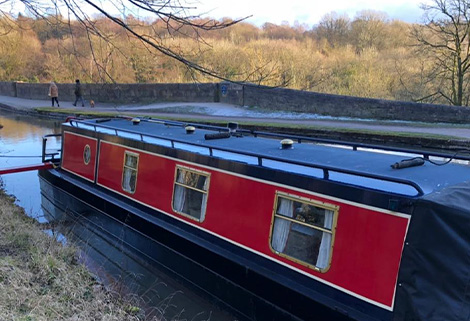 I bought Blackbird, a 40ft narrow boat just over a year ago and have just completed my first year as a Continuous Cruiser. It’s been a wonderful time (mostly)! I have enjoyed travelling through the inland waterways enormously. It has given me an appreciation of our nation’s industrial heritage in a way that no amount of reading or consumption of modern media technology ever could. I now know why the Black Country was so named, the importance The River Weaver played in the salt trade, I have learnt about the movement of coal and limestone along The Lancaster Canal and the connectivity between Cornish clay and The Staffordshire Potteries. I have experienced first-hand the power of The English Rivers, not just as forces of nature, but as the living veins of our earliest transport routes. I have also learnt a good deal of practical things that have helped me make living on board a pleasure, I am sure other boaters could add a their own advice….
I bought Blackbird, a 40ft narrow boat just over a year ago and have just completed my first year as a Continuous Cruiser. It’s been a wonderful time (mostly)! I have enjoyed travelling through the inland waterways enormously. It has given me an appreciation of our nation’s industrial heritage in a way that no amount of reading or consumption of modern media technology ever could. I now know why the Black Country was so named, the importance The River Weaver played in the salt trade, I have learnt about the movement of coal and limestone along The Lancaster Canal and the connectivity between Cornish clay and The Staffordshire Potteries. I have experienced first-hand the power of The English Rivers, not just as forces of nature, but as the living veins of our earliest transport routes. I have also learnt a good deal of practical things that have helped me make living on board a pleasure, I am sure other boaters could add a their own advice….
Condensation.
I was rather surprised at how much condensation could appear after just one night; even when the boat was reasonably warm. I now try to:
Warm the cold places of the boat by opening cupboard doors.
Wipe down the windows each morning with an absorbent cloth; as it prevents moisture getting into the window frames and causing rot.
Open the galley window a little when cooking.
Insulate, insulate, insulate! Everywhere you can.
Create airflow routes, I drilled holes in the board that supports the mattress and in the draw fronts under the bed. You can make patterns so the holes are decorative as well as practical.
Wood Burners.
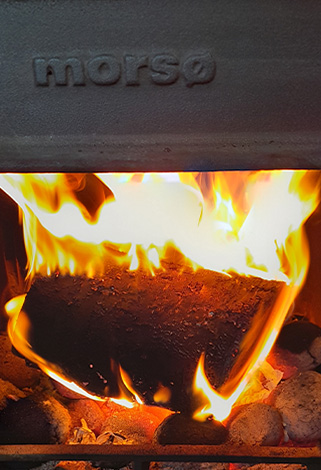 I have used open fires and stoves for 30 years and so am very familiar with the art of fire making. However, the stove on Blackbird is fairly small and making the most of the warmth has taken some thought.
I have used open fires and stoves for 30 years and so am very familiar with the art of fire making. However, the stove on Blackbird is fairly small and making the most of the warmth has taken some thought.
I always have a good supply of dry kindling and small logs to hand to get the fire going quickly after a cold day's cruising.
A dedicated bucket for ash and a small shovel are very useful.
Keep your eyes open for the wonderful local coal barges and stock up when you can. There are several different smokeless products available which burn at different rates and have different heat outputs. Try a few until you find the sort that works best in your boat.
My stove heats the space best when it is on long and low; I fill it up in the evening before I go to bed and turn the vent right down. Even if it goes out during the early hours of the morning there is enough heat to take the edge off the chill.
Forage for wood as you go, log it with a bow saw and store it somewhere to dry.
Make good use of the top of the stove to slowly cook a stew. I use a trivet under the pot to stop the bottom burning. It’s an ideal place to warm a kettle too.
Mooring
Angle mooring pins and position them well back from the bank, in wet ground they can pull sideways with the movement of passing boats and slip out, even when they are hammered fully in.
Use brightly coloured plastic bags around the tops of the pins to highlight their position to other towpath users. Sainsbury’s are perfect!
If you don’t have a piling pin, a normal long pin can be used. Position it vertically through the back of the horizontal piling and wrap the lines over the top and bottom of the pin before tying off on the dolly.
Learn to tie a few knots, a round turn and two half hitches, a canal man’s hitch and a clove hitch will all be useful.
Clothes
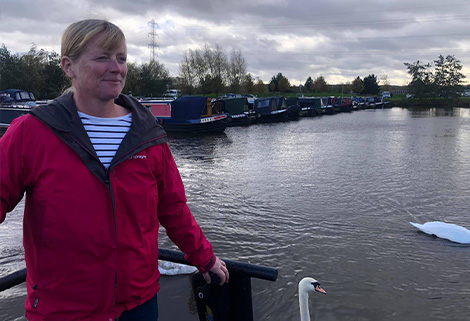 Be ruthless, chose what you really need and give the rest to a charity shop.
Be ruthless, chose what you really need and give the rest to a charity shop.
Pack the clothes that you aren’t wearing in vacuum bags, it will save space and keep them dry.
Slip on shoes are perfect for going in and out of the boat, especially when it’s muddy.
Fuel
Keep diesel tanks as full as possible, especially in the winter. Diesel bug lives in the water film between the air gap and the diesel layer. I had it in my engine and it clogged up my fuel filters. If you do get diesel bug it can be treated with products available in most chandlers.
A spare gas cylinder is a very useful thing! I buy mine from the fuel barge.
Engines
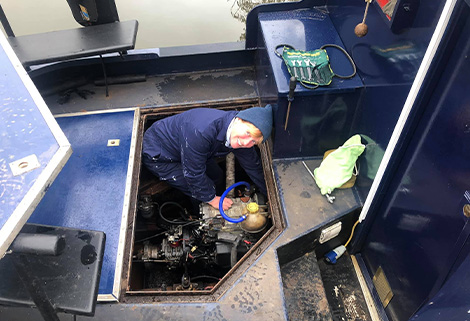 I knew very little about diesel engines a year ago, now I can change the oil, and filters, tighten and replace an alternator belt, monitor the coolant and oil levels and pack a stern gland greaser with grease. These are all surprisingly easy jobs, learning how to do them will save you money and give you confidence in your engine.
I knew very little about diesel engines a year ago, now I can change the oil, and filters, tighten and replace an alternator belt, monitor the coolant and oil levels and pack a stern gland greaser with grease. These are all surprisingly easy jobs, learning how to do them will save you money and give you confidence in your engine.
I have also assisted in replacing an alternator and removing a gear box that needed to be reconditioned. I really like engines now!
The weed box should be examined regularly especially in areas that have a lot of rubbish or vegetation in the water. I have been surprised by how little weed around the prop it takes to lose a lot of power. I have also learnt to know when there is a lot of weed on the bow by the sound of the engine.
Make a note of the part numbers for your filters and belts and keep some spares, you never know when you might need them.
Cruising
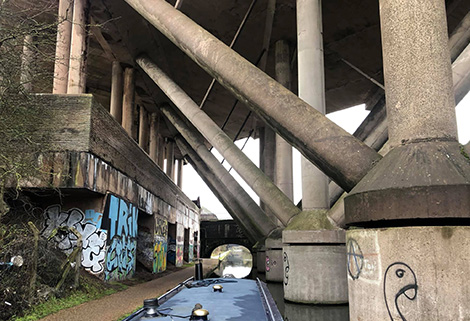 A guide book makes the journey richer as you can understand the history of the environment around you.
A guide book makes the journey richer as you can understand the history of the environment around you.
Go slowly, stop often and explore the places you pass through.
Talk to the people around you and hear their stories.
Security
Pick your mooring spot carefully, ideally around other boats. If you have to leave the boat for a while, there are several things you can do to deter would be intruders:
Place a pair of big, old boots just outside the door.
Set a battery powered radio to come on in the evening.
Twinkling fairy lights make the boat look as if there is someone inside.
I have met lots of interesting people both on and off the boats who have been so kind and helpful. There is never any shortage of advice! I have loved boating life and can’t wait for year two!

